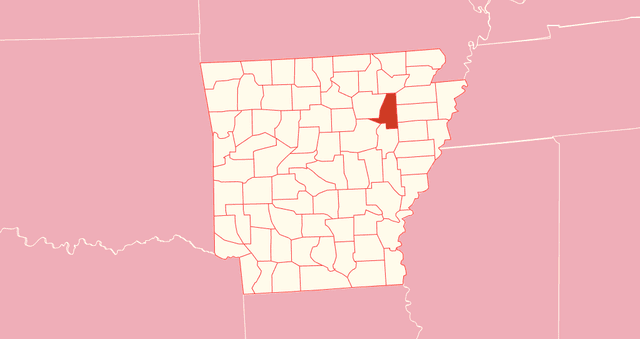
Rehabs in Jackson
Jackson County is located in the state of Arkansas. It is the 41st largest county in Arkansas out of the 75. It covers 633.94 square miles. 7,601 households made up the county's population of 17,997 as of the 2010 Census.
In a given year, over 400,000 Arkansans use illegal substances. It makes up 13.13% of the state's total population. The other 133,000, or 4.4%, abuse alcohol.
As a result, drugs and alcohol were responsible for 12.78% of all deaths in Arkansas between 2008 and 2017. That is approximately the same as the national average of 12.71% for fatalities brought on by controlled drugs and alcohol over the same period.
Inpatient and Outpatient Programs
There are two main types of treatment in Jackson County rehabs. Those are inpatient and outpatient plans. All services are available in an inpatient program. In this case, clients stay overnight.
Some rehabilitation services offer outpatient care as well. In this case, patients do not stay there. There are people with severe addictions, who require intensive treatment in a setting where temptation and triggers are minimized. For them, inpatient care is considered the best option.
Jackson County also offers flexibility to those unable to take time away from their daily lives, jobs, or education through outpatient programs. However, patients often meet for a few hours at the clinic a few times per week.
It's important to mention that both inpatient and outpatient courses treat nearly all drug addictions. They both employ similar therapy methods. Cognitive-behavioral therapy and contingency management are examples of that.
Top Rehabilitation Facilities in Jackson County, Arkansas
Here are some mental health facilities in Jackson County, Arkansas. The majority of them offer treatment for dual diagnoses. Adults and teens with mental health difficulties can receive therapy at those Jackson County mental health facilities.
Unity Health Harris Medical Center Clearview
The Unity Health Harris Medical Center Clearview provides telemedicine and telehealth services. Additionally supported are those with eating disorders and trauma survivors. People with co-occurring mental and substance use problems are on this list, too.
In addition, this place offers integrated primary care services, legal representation, and diet and fitness counseling.
Life Strategies of Arkansas LLC Newport Clinic
The Newport Clinic at Life Strategies of Arkansas LLC provides outpatient care, telemedicine, and telehealth services. Thus, patients can receive integrated dual-diagnosis disorder treatment and trauma therapy. If you need psychotropic medication, you can get it here as well.
Additionally, the Newport Clinic at Life Strategies of Arkansas LLC serves patients with eating disorders. PTSD and other traumatic experiences are on this list as well. Its services include chronic disease management and family psychoeducation. Court-ordered outpatient treatment can be found here, too.
Birch Tree Communities Inc. Newport
This facility provides residential, outpatient, and partial hospitalization or day treatment. Patients can receive group therapy, couples, and family counseling. They can also get behavior modification services from Birch Tree Communities Inc. Newport.
Additionally, the center assists those with major mental illnesses and clients referred by the legal or judicial systems. This means that it offers case management and outpatient therapy mandated by a court. Illness management and rehabilitation are some other services that Birch Tree Communities Inc. Newport offers.
Life Strategies Counseling
Life Strategies Counseling provides outpatient therapy. This place includes case-control and family psychoeducation. But people can get court-mandated outpatient therapy here too. Patients with endured trauma, post-traumatic stress disorder, and others are all supported by this hospital.
Forcing a Teen Into Rehab
Parents of addicted teenagers have access to various treatment options. That enables them to continue their education while undergoing therapy. So, here are some recommendations to assist parents of kids with drug issues in enrolling their kids in recovery programs.
Talk to your teens about their difficulties after they've produced a list. After that, work to find solutions. Ask them to list three justifications for not wanting to consult an expert rather than starting an argument. Additionally, be sure to counteract each of their shortcomings. Do this with a constructive attitude.
And here comes the most important part. If teens decide to give up on addiction, that's great! But don't forget to explain that getting professional help is a must to achieve their goal.
Make it clear that you'll be there to help them. Visit them frequently while they're through treatment. If you do so, they'll think you don't discipline them or "send them away".
